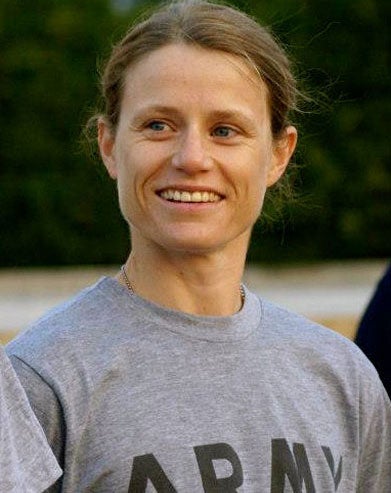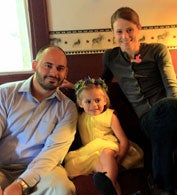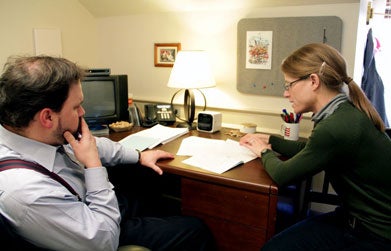Title: Veteran, Activist Awarded Public Policy Scholarship, Featured in Film
From serving in Iraq to being a body double in a film directed by Jennifer Aniston and other actresses about the impact of breast cancer, U.S. Army soldier Margaret (Maggie) Smith (G’13) has had anything but a typical life.

Maggie Smith (G’13) is the service chair of Georgetown Public Policy Institute’s student association and an active advocate and mentor for the “previvor” community a group of people who carry the BRCA 1 or 2 genes linked to breast and ovarian cancer.
– From serving in Iraq to being a body double in a film directed by Jennifer Aniston and other actresses about the impact of breast cancer, U.S. Army soldier Margaret (Maggie) Smith (G’13) has had anything but a typical life.
Smith, who is pursuing a master’s in public policy, is the recipient of the 2012-2013 Whittington Scholarship.
The annual award is named after Georgetown Public Policy Institute (GPPI) associate dean and professor Leslie Whittington, who died on 9/11 with her husband and two small children when terrorists hijacked American Airlines Flight 77 and crashed it into the Pentagon.
Incredibly Meaningful
The scholarship is awarded each year from a fund created by the Whittington family to a second-year public policy student who excels academically and is committed to service.
“This scholarship is incredibly meaningful to our community, and is one of the ways we are able to honor Leslie’s legacy of scholarship and service at GPPI,” says Edward Montgomery, dean of GPPI. “Maggie has excelled academically and she has demonstrated a deep commitment to the GPPI community and our country through her service in the military and in the local community. I cannot think of a better candidate for this honor.”
The master’s degree candidate is the service chair of GPPI’s student association and an active advocate and mentor for the “previvor” community – a group of people who carry the BRCA 1 or 2 genes linked to breast and ovarian cancer that includes Smith herself.
The student also volunteers in the Oliver neighborhood of Baltimore, where HBO’s series The Wire was filmed, partners with the Comprehensive Breast Center at Walter Reed National Military Medical Center to advise women with positive BRCA tests, and is an advocate, mentor and fundraiser with FORCE: Facing Our Risk of Cancer Empowered, among other activities.
After finding out that she had one of the genetic mutations, she elected to have a prophylactic (or preventive) bilateral mastectomy and hysterectomy.
Body Double

The Whittington Scholarship recipient, shown here with her daughter Emily, says the award is an honor and holds particular meaning for her as a mother since its namesake died with her two young children.
She appeared topless as a body double in Five, an anthology of five short films about how breast cancer affects people for Lifetime Television. Jennifer Aniston, Demi Moore, Patty Jenkins and Penelope Spheeris directed the films.
“It was strange to see my body on screen, but it was definitely good for me because it gave me a broader outlet to show the fact that you don’t have to look just like everybody else,” Smith says.
She called getting the scholarship “an amazing honor.”
“…It means a lot to know that the way that I have chosen to live my life – or the way I try to be as a person – is actually how I’m being,” Smith says. “It was a long road to get to a place where I could say, ‘I’m proud of myself.’ So this award feels pretty good and is a reaffirmation of all the hard work I’ve put in.”
Particularly Meaningful
Whittington, a professor of economics and public finance, and her family were headed to Australia, where she had accepted a research fellowship at the Australian National University in Canberra. The family never made it out of the Washington area.
GPPI also holds the annual Whittington Lecture, which brings a renowned speaker to address a policy issue, in her honor.
Smith says getting the scholarship is particularly meaningful to her because Whittington died with her two young children, one of whom was only 3 years old. Smith’s daughter, Emily, is 4.
“I have a 4-year old daughter … Leslie’s daughter was 3. It’s hard to wrap your mind around a tragedy like that, because [these young children] are so full of life.”
Unusual Path
Smith, who attended prep school in New Hampshire, spent three years at Boston College, then decided to leave school with the intention of taking only a year off.
“That never happened,” she says.
Smith ended up traveling throughout Europe and to Morocco and Gibraltar, worked at a dude ranch in Jackson Hole, Wyo., and eventually wound up in Salt Lake City, where she decided to join the Army.
She also successfully battled alcoholism during this time, saying she drank to avoid a life that was filled with a fear of cancer.
“I was pretty much enjoying life in Salt Lake City and refinishing antique furniture, not really doing anything, and then I decided that I really needed to get serious,” she explains.
She enlisted in the military in June 2004, at age 23, a few days after seeing an Army advertisement on TV.
Lifted Load

After her mastectomy, Maggie Smith says husband Patrick was supportive when she opted against reconstructive surgery since she wouldn’t have been able to pick up her then-9-month-old daughter, Emily, for several months if she had had the procedure.
Her first duty station was in Darmstadt, Germany, and shortly thereafter she was deployed to Balad, Iraq, a logistical base north of Bagdad, where she remained for a year as an administrative assistant and electronic maintenance technician.
After that she held a position as a satellite communications specialist for a rapid-deployable unit out of Aberdeen Proving Ground, Md. In 2008 Smith married her husband, Patrick, also a non-commissioned officer in the Army, and gave birth to their daughter Emily.
In 2009, when Smith was stationed at Fort Meade in Maryland, she discovered that she had the BRCA gene, which she says can increase the risk of breast cancer to as high as 80 percent, and ovarian cancer from 15 to 40 percent.
Smith, whose mother has battled breast cancer for more than 20 years and whose aunt passed away from breast cancer, says the discovery was a kind of relief.
“When I found out that I had it, it was almost like this huge load had been lifted off my shoulders,” she says. “It was this huge burden because it’s a nightmare to watch people go through [cancer]. I knew exactly what I wanted to do.”
Holding a Daughter
After her mastectomy, Smith chose not to get reconstructive surgery. Her daughter was 9 months old at the time and the surgery would have prevented her from picking up Emily for several months.
Her husband was incredibly supportive.
“The basic point of the reconstructive surgery is to make you look ‘normal’ in clothes, but that wasn’t worth not being able to hold my daughter,” she says.
Smith started an online undergraduate program at Pennsylvania State University the following fall, and graduated in May 2011 with a bachelors of arts in law and society and a 4.0 GPA.
Pursuing More Education

GPPI professor Adam Thomas goes over quantitative policy methods with Maggie Smith during his office hours.
“Fort Meade is really where my education picked back up again,” she says.
While on active duty and raising her daughter, Smith decided to apply to master’s programs in order to earn her commission as an Army officer.
After being accepted to GPPI and selected to participate in Georgetown’s Reserve Officer Training Corps (ROTC), Smith began her studies in the fall of 2011.
She now lives in Arlington with her family.
A typical day involves a 5:30 a.m. wakeup call for physical training with ROTC, where as cadet battalion commander, she’s in charge of 120 cadets.
That routine is followed by a day of studying, volunteer duties, and attending her six classes at Georgetown.
Selfless Service
Smith has received the Army Commendation Medal, the Joint Service Commendation Medal, the Iraqi Campaign Medal and was named Lifetime Television’s 2011 “Remarkable Woman,” among many other military and civilian recognitions.
“Service is my life – I am a United States Army soldier,” says Smith “However, service to the nation differs from service to the community and both require dedication.”
“Ultimately, I strive to strengthen the army value of ‘selfless service’ at GPPI,” she adds. “I serve the country but it’s important to remember that you have a community as well as a country.
“That’s how I want to raise my daughter – to have an appreciation for doing things for other people without getting anything but a smile.”